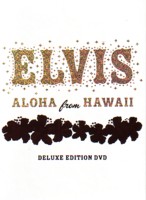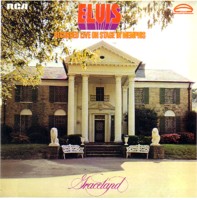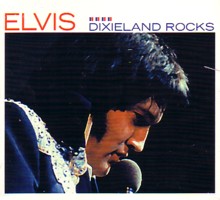Elvis'
"right hand" man remembers
|
Joe
Esposito was driving to Indiana from Chicago, the city
from which he first came into this life more than 70
years ago. All along the highway, it was raining.
He
was on his way to the state where the Indianapolis Market
Square Arena once stood; the place where Elvis Presley
had given his final live performance in June 1977. Esposito
attended that show, just as he had every other Presley
performance dating back to 1960. Six weeks after The
King of Rock 'n' Roll ruled Indiana, Esposito was summoned
to Graceland where the 42-year-old singer was motionless
in distress. The King was dying.
|
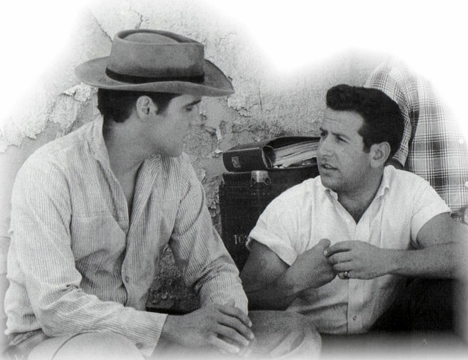 |
Esposito
still shudders at the memory. 'I couldn't do any mouth to
mouth because his mouth was closed,' Esposito said. 'Shut
tight. I did the heart massage and called for an ambulance,
but in my own mind, I already knew there was no bringing him
back. Thirty minutes later he was gone.' Twenty-seven years
later, as he drove along the lonely stretch of American highway,
Esposito was thinking about that day. 'That was a tough one.'
The
two met in Germany when they served in the U.S. Army together.
It was 1959. Elvis was already a star. A friendship was born
that endured long after they returned stateside. Esposito
became Presley's road manager. He was a best man at Elvis
and Priscilla's 1967 wedding, and was there nine months later
when the couple's daughter, Lisa Marie, was born.
He
traveled alongside Elvis during his movie days of the 1960s,
observed The King's return to the throne during his 1968 comeback
and accompanied him through the white jumpsuit and Las Vegas
palace days of the 1970s. Elvis joined the service at the
height of his popularity and in those days, out of the public
eye.
'Elvis was very concerned when he was in the Army, because
he didn't know if his fans would accept him when he returned.
Show business was new to me. I didn't know anything about
it, so I didn't think about whether he would be popular or
not. We just became friends,' Esposito said.
In
retrospect, he said, before Presley went into the service,
he wasn't at the top of the parental approval rankings during
the era defined by James Dean's 'rebels' and Marlon Brando's
'wild ones.' For his part, Elvis was the guy who sang things
like 'Jailhouse Rock' and 'All Shook Up' and was seen gyrating
into the middle of American living rooms with his frenzied
howling that preached 'You ain't nothin' but a hound dog.'
'They
would say who is this wild kid shaking his legs? But when
he came back, after he did his full two years in the service
and served with the rest of the GIs, he got a lot of respect
from the adults. Luckily, he came back stronger than ever,'
Esposito said. After the Beatles and the resulting British
invasion threw the singer's popularity a curve in the mid-1960s,
Presley returned time and again, topping the pop charts in
1969 with his 'Suspicious Minds' and through the '70s with
popular tunes like 'Burning Love.'
There
were plenty of turbulent times during their friendship in
the days before the invention of the TV remote control. Presley
had a fondness for guns and expressed his disapproval of what
was playing on the TV screen by shooting the set. Automobiles
weren't spared either. If a car didn't 'run right,' Elvis
would load up the firearm and pump the dashboard full of bullets
before collapsing in a fit of giggles.
He
wasn't the kind of guy who you would expect to wait for an
apology either, Esposito said. 'If he made a mistake, he wouldn't
say he was wrong. He would just buy you something,' Esposito
said. And the buying could be extravagant. 'He showed up in
my apartment one day and knocked on the door,' Esposito recalled.
'He
looked at my two girls, who were little at the time and me
and my wife living in this apartment and he said, 'Hey, you
need a house.' I couldn't believe this, but we went and looked
at a few houses and Elvis would say 'Well, what you think
about this one?'Ÿ' They finally found one they liked. Presley
wrote out a check for $10,000 for a down payment for the home
for Esposito and his family. 'He never even negotiated a deal,
he just said, 'OK, it's yours.' I said, 'Elvis, I like it
very much, but I can't afford the payments on this house.'
He told me not to worry about it, and then he gave me a pay
raise so I would be able to afford it,' Esposito said.
Esposito
handled many details of Presley's personal and professional
life and has fond family memories of his two daughters growing
up with Presley's daughter. Frequently consulted for historical
information for a number of Presley-focused movies and documentaries,
Esposito has documented the times in a pair of his own books,
'Good Rockin' Tonight,' and 'Intimate and Rare.'
|
Esposito
is making the journey back across the country to the
kick off this weekend's first-ever Lake George Elvis
Festival. It will also mark Esposito's first trip to
Lake George. 'I've never been there before. I hear it's
beautiful though,' he said. 'Tell people to come on
out. It's going to be a great time and we'll make a
whole lot of new friends.'
Fifty
years after Presley recorded his first song and more
than a quarter century after the singer's death, Esposito
said that no matter how Elvis' popularity would have
turned out after their Army stint together, there is
one thing he is sure of. 'I do know whatever would have
happened, he would have been singing. That was what
he wanted to do. He just loved to sing for people,'
Esposito said.
|
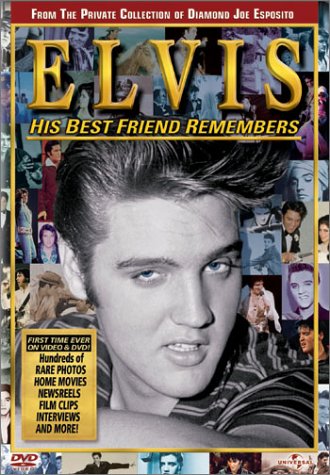 |
In
remembering the man they called The King, Esposito offers
an educated guess as to Presley's continuing popularity. 'Twenty-seven
years later, he still has new fans that love his music and
love his looks. Why? Because people love his music and it
makes them feel good. If they feel depressed, they put on
an Elvis record and they feel better. That's it right there.
Elvis had a real special gift,' Esposito said.
And
that is the memory that Esposito will hold close for the rest
of his days -- the one that will accompany him through the
rainy nights and the one that will carry him along all the
highways of last chances, as he travels across America and
remembers the times he shared with the man he calls his best
friend. (Spotlight/Article, Source: Scene
& Heard, October 2004)
|

